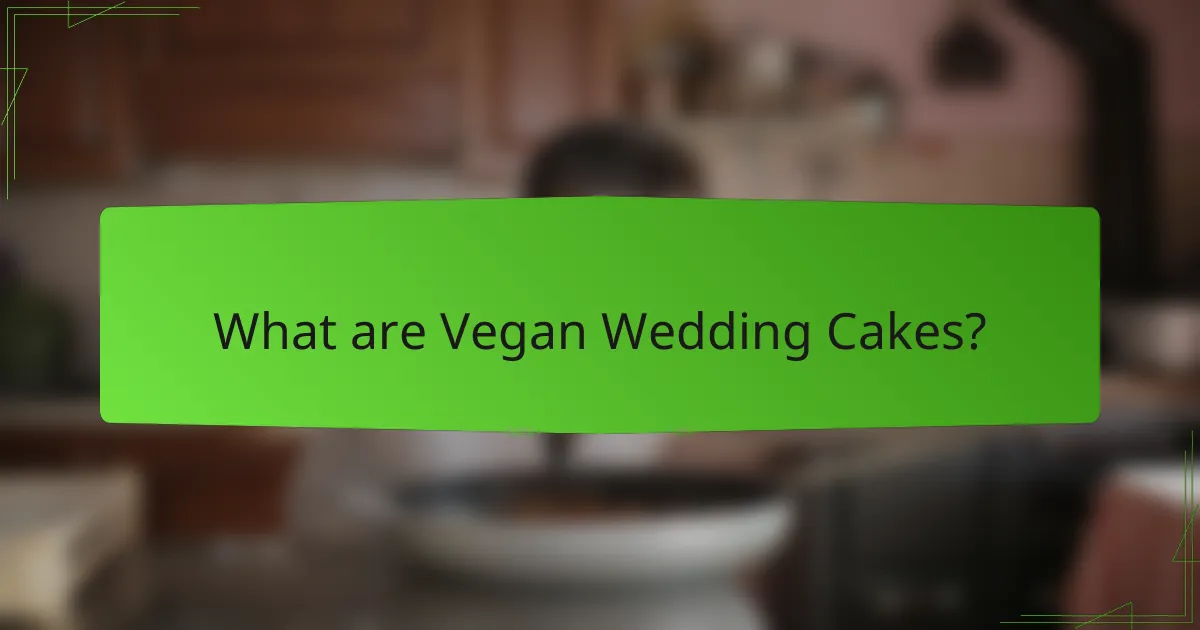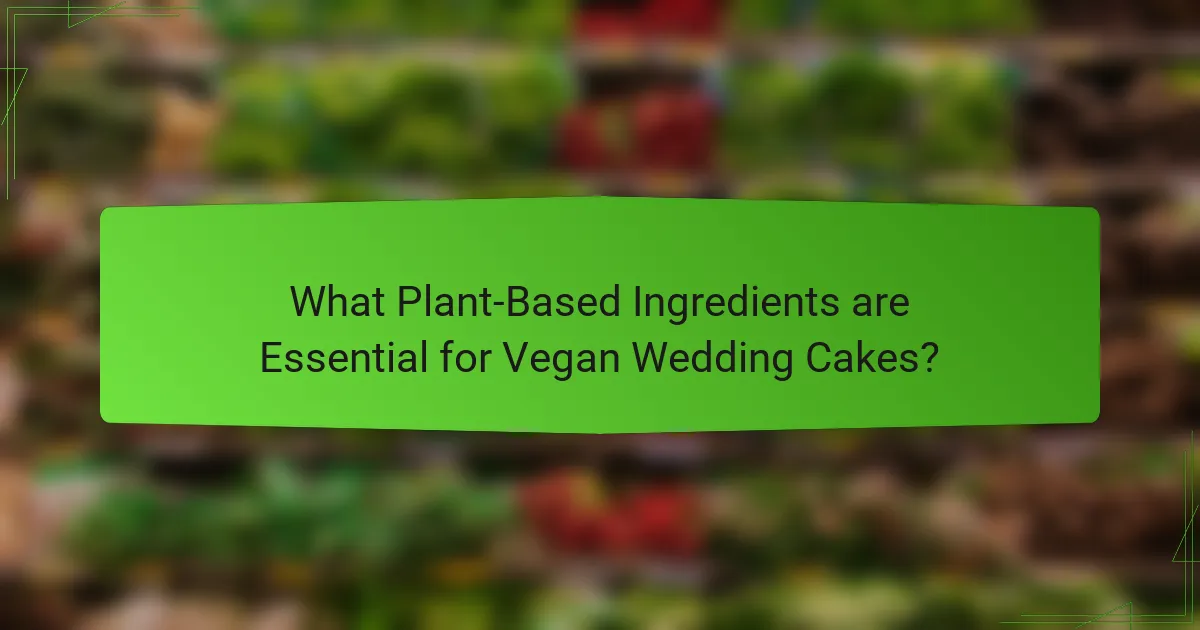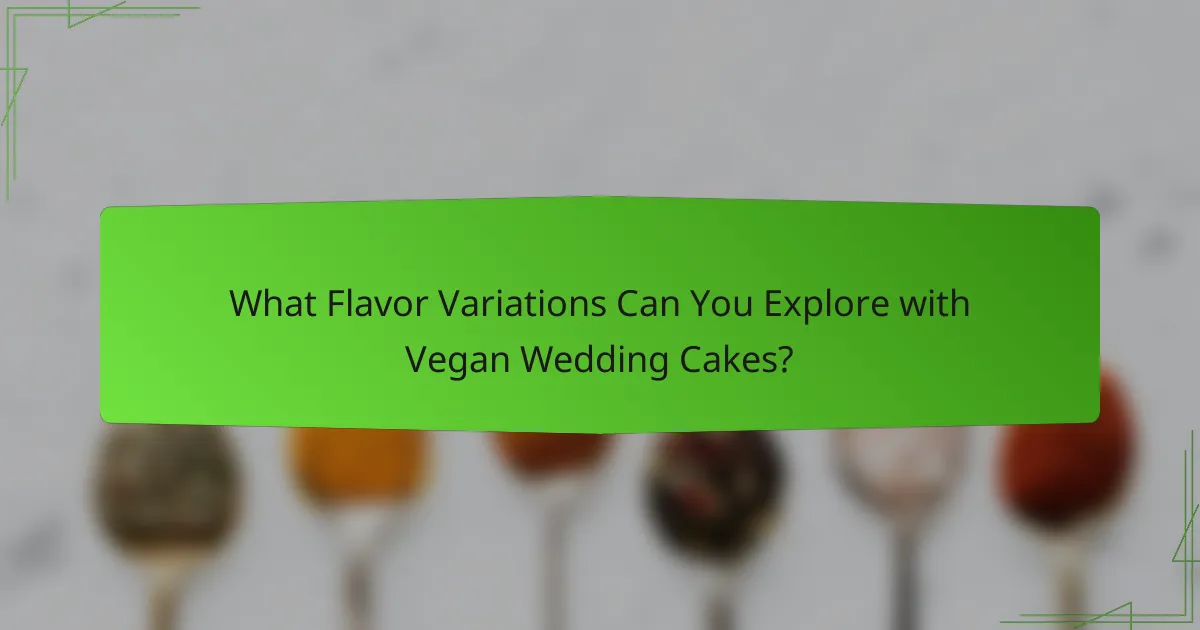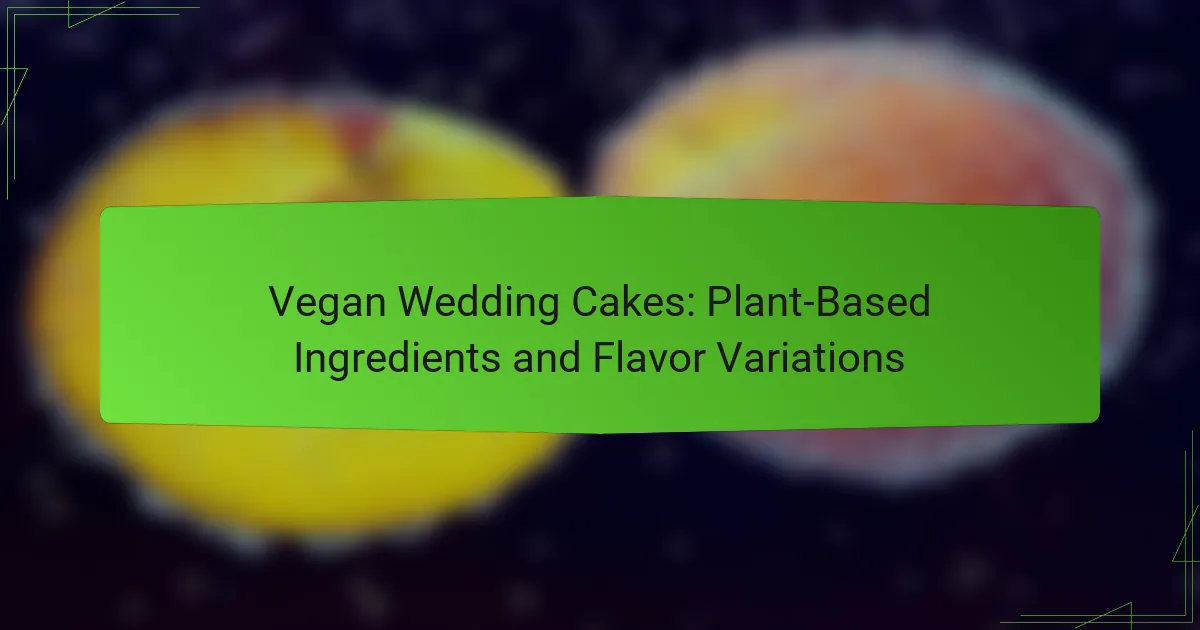
What are Vegan Wedding Cakes?
Vegan wedding cakes are cakes made without any animal products. They use plant-based ingredients such as flour, sugar, and non-dairy milk. Common substitutes for eggs include flaxseed meal or applesauce. Vegan butter or coconut oil often replaces traditional butter. These cakes can be flavored with fruits, nuts, or spices. Many vegan cakes are also suitable for those with dairy allergies. The demand for vegan wedding cakes has increased as more couples seek plant-based options. Studies show that vegan diets can have environmental benefits, making these cakes a popular choice for eco-conscious weddings.
How do Vegan Wedding Cakes differ from traditional cakes?
Vegan wedding cakes differ from traditional cakes primarily in their ingredients. Vegan cakes do not contain any animal products, such as eggs or dairy. Instead, they use plant-based substitutes like applesauce, flaxseed, or aquafaba for binding and moisture. Traditional cakes often rely on butter and milk for flavor and texture. This substitution can lead to a different taste and texture profile in vegan cakes. Vegan cakes may also utilize alternative sweeteners like maple syrup or agave nectar. These differences can impact the overall flavor and density of the cake. Vegan wedding cakes can still achieve a rich taste through the use of high-quality cocoa, fruits, and spices. Many bakers now specialize in vegan recipes that mimic traditional flavors effectively.
What ingredients are commonly used in Vegan Wedding Cakes?
Common ingredients used in vegan wedding cakes include flour, sugar, plant-based milk, and vegetable oil. Flour provides the structure for the cake. Sugar adds sweetness and moisture. Plant-based milk, such as almond or soy, acts as a liquid component. Vegetable oil contributes to the cake’s tenderness. Other ingredients may include baking powder for leavening and applesauce or mashed bananas as egg replacements. These components ensure the cake remains moist and flavorful while adhering to vegan dietary restrictions.
How do the textures and flavors compare between vegan and non-vegan cakes?
Vegan cakes typically have a lighter texture compared to non-vegan cakes. This is due to the absence of eggs, which provide structure and moisture in traditional cakes. Vegan cakes often rely on ingredients like applesauce, flaxseed, or aquafaba to mimic these properties.
Flavors in vegan cakes can be just as rich and diverse as those in non-vegan cakes. Ingredients such as coconut milk, nut butters, and various flavor extracts enhance the taste. Non-vegan cakes often have a buttery flavor profile, which can be difficult to replicate.
However, many vegan bakers use plant-based butters and oils to achieve a similar richness. A study by the Journal of Food Science found that plant-based ingredients can create comparable sensory experiences in baked goods. This indicates that while the textures may differ, the flavor profiles can be equally satisfying.
Why choose a Vegan Wedding Cake for your special day?
A Vegan Wedding Cake is a great choice for your special day due to its ethical and health benefits. Vegan cakes are made without animal products, making them suitable for those with dietary restrictions. They often contain healthier ingredients, such as fruits, nuts, and whole grains. This can result in lower cholesterol and saturated fat levels compared to traditional cakes. Additionally, many vegan cakes are just as delicious and can be rich in flavor. Studies show that plant-based diets can improve overall health, making vegan cakes a smart option. Choosing a vegan cake also supports sustainable practices, as it reduces the carbon footprint associated with animal farming. Overall, a Vegan Wedding Cake can enhance your celebration while aligning with health-conscious and ethical values.
What are the ethical benefits of selecting a Vegan Wedding Cake?
Selecting a Vegan Wedding Cake promotes ethical treatment of animals. Vegan cakes do not contain any animal-derived ingredients, reducing demand for animal farming. This choice supports animal welfare by minimizing suffering associated with livestock production. Additionally, vegan baking often utilizes sustainable, plant-based ingredients. This practice can lower the environmental impact compared to traditional cakes. Studies show that animal agriculture contributes significantly to greenhouse gas emissions. By choosing a vegan cake, couples can align their celebration with values of compassion and sustainability. This decision reflects a commitment to ethical consumption and responsible food choices.
How can Vegan Wedding Cakes accommodate dietary restrictions?
Vegan wedding cakes can accommodate dietary restrictions by using plant-based ingredients that are free from common allergens. These cakes can be made without dairy, eggs, and gluten, catering to vegans and those with allergies. For instance, almond milk or coconut milk can replace dairy milk. Flaxseed or chia seeds serve as egg substitutes, providing binding without animal products. Gluten-free flours, like almond or coconut flour, can replace traditional wheat flour. Additionally, natural sweeteners like maple syrup or agave nectar can be used instead of refined sugars. This versatility allows for customization based on individual dietary needs. Many bakeries offer options specifically designed for various restrictions, ensuring inclusivity for all guests.

What Plant-Based Ingredients are Essential for Vegan Wedding Cakes?
Essential plant-based ingredients for vegan wedding cakes include flour, sugar, plant-based milk, and vegetable oil. Flour serves as the base structure of the cake. Common choices are all-purpose flour or whole wheat flour. Sugar adds sweetness and moisture. Granulated sugar or coconut sugar works well in vegan recipes. Plant-based milk, such as almond or soy milk, replaces dairy milk for moisture. Vegetable oil, like canola or coconut oil, provides fat for richness. Additionally, ingredients like applesauce or mashed bananas can act as egg substitutes, adding moisture and binding. These components create a delicious and cohesive vegan wedding cake.
What are the key substitutes for eggs in Vegan Wedding Cakes?
Key substitutes for eggs in vegan wedding cakes include applesauce, flaxseed meal, and aquafaba. Applesauce acts as a binding agent and adds moisture. Flaxseed meal mixed with water creates a gel-like consistency that mimics eggs. Aquafaba, the liquid from canned chickpeas, can be whipped to create a light texture. Each substitute provides unique properties that contribute to the cake’s structure and moisture. These alternatives are widely used in vegan baking to replace eggs effectively.
How do different egg substitutes affect the final product?
Different egg substitutes can significantly alter the texture, moisture, and binding properties of vegan wedding cakes. For instance, applesauce adds moisture and sweetness but may create a denser cake. Flaxseed meal acts as a binder, providing a chewy texture, while also adding nuttiness. Aquafaba, the liquid from chickpeas, mimics egg whites, contributing to a lighter, airy texture. Silken tofu can create a rich, dense cake but may require additional leavening agents. Each substitute interacts uniquely with other ingredients, impacting the final flavor and consistency. These variations are essential for achieving desired results in vegan baking.
What role do plant-based milks play in cake recipes?
Plant-based milks serve as a dairy substitute in cake recipes. They provide moisture and contribute to the cake’s texture. Common types include almond, soy, oat, and coconut milk. Each type adds unique flavors and nutritional benefits. For example, almond milk is low in calories, while coconut milk adds richness. Plant-based milks also help bind ingredients together, similar to dairy milk. They can be used in various cake types, including sponges and frostings. Many bakers report that plant-based milks yield cakes that are just as moist and flavorful as traditional recipes.
Which sweeteners are best for Vegan Wedding Cakes?
Maple syrup, agave nectar, and coconut sugar are the best sweeteners for vegan wedding cakes. Maple syrup adds moisture and a rich flavor. Agave nectar is highly soluble and sweet, making it ideal for batters. Coconut sugar has a low glycemic index and provides a caramel-like taste. These sweeteners are plant-based, aligning with vegan dietary requirements. Their unique properties enhance both flavor and texture in vegan cakes.
How do natural sweeteners compare to refined sugars in flavor and texture?
Natural sweeteners generally have a more complex flavor profile compared to refined sugars. They often carry additional notes from their source, such as fruity or floral undertones. For example, maple syrup has a rich, earthy taste, while agave nectar is milder and more neutral.
In terms of texture, natural sweeteners can vary significantly. Honey is thicker and more viscous than granulated sugar, while coconut sugar has a grainy texture. Refined sugars typically dissolve easily and provide a consistent sweetness.
Natural sweeteners can also contribute moisture to baked goods. This can enhance the overall texture of vegan cakes. A study published in the Journal of Food Science indicates that using honey can result in a denser cake compared to using granulated sugar.
Overall, the choice between natural sweeteners and refined sugars affects both flavor and texture in baking.
What are the benefits of using alternative sweeteners?
Alternative sweeteners provide lower calorie options compared to traditional sugars. They can help manage blood sugar levels, making them suitable for diabetics. Some alternative sweeteners, like stevia, are derived from natural sources. They often contain fewer carbohydrates, aiding in weight management. Many alternative sweeteners do not contribute to tooth decay. Research shows that using these sweeteners can reduce overall sugar intake. For example, a study published in the “American Journal of Clinical Nutrition” found that replacing sugar with sweeteners can lower calorie consumption. Thus, alternative sweeteners offer health benefits while maintaining sweetness in foods.

What Flavor Variations Can You Explore with Vegan Wedding Cakes?
Vegan wedding cakes can feature a variety of flavor variations. Popular options include chocolate, vanilla, and lemon. Unique flavors such as lavender, chai spice, or matcha are also available. Fruit-based cakes, like strawberry or raspberry, offer fresh alternatives. Nut flavors, such as almond or hazelnut, provide a rich taste. Additionally, combinations like chocolate mint or coconut lime are becoming trendy. These flavors can be achieved using plant-based ingredients, ensuring a delicious and inclusive dessert option.
What are popular flavor profiles for Vegan Wedding Cakes?
Popular flavor profiles for vegan wedding cakes include chocolate, vanilla, and lemon. Chocolate cakes often use cocoa powder and plant-based milk for richness. Vanilla cakes typically incorporate vanilla extract and almond milk for a light flavor. Lemon cakes are known for their refreshing citrus taste, achieved with fresh lemon juice and zest. Other popular flavors include red velvet, carrot, and coconut. Red velvet cakes use beet juice for color and flavor. Carrot cakes feature grated carrots and spices like cinnamon. Coconut cakes are made with coconut milk and shredded coconut for a tropical touch. These flavors cater to diverse palates and are widely appreciated in vegan baking.
How can you incorporate seasonal fruits into your cake design?
Incorporating seasonal fruits into cake design enhances flavor and aesthetics. Use fresh fruits as decorative elements on top of the cake. Arrange slices of fruits like strawberries, peaches, or blueberries artistically. Create fruit purees to drizzle or layer between cake tiers. Consider using fruits in the batter for added moisture and taste. Seasonal fruits also contribute vibrant colors, making the cake visually appealing. For instance, citrus fruits can add a refreshing zest. Additionally, fruits can be used in fillings or frostings to complement the overall flavor profile.
What unique flavor combinations are trending in the vegan cake world?
Unique flavor combinations trending in the vegan cake world include lavender and lemon, matcha and coconut, and chocolate and avocado. These combinations are gaining popularity for their distinct tastes and health benefits. Lavender and lemon provide a refreshing floral and citrus balance. Matcha and coconut offer a creamy texture with earthy notes. Chocolate and avocado create a rich, decadent flavor while maintaining a healthy profile. These trends reflect a growing interest in innovative plant-based desserts.
How can you customize a Vegan Wedding Cake for your wedding theme?
You can customize a Vegan Wedding Cake for your wedding theme by selecting flavors, colors, and decorations that match your theme. Choose flavors like vanilla, chocolate, or lemon that resonate with your wedding’s color palette. Incorporate natural food coloring to achieve desired shades in the cake and frosting. Use seasonal fruits or edible flowers as decorative elements to enhance the visual appeal. Personalize the cake with themed cake toppers or unique designs that reflect your wedding’s motif. Vegan cakes can also accommodate dietary restrictions, ensuring all guests enjoy the dessert. Customization options are virtually limitless, allowing for a unique representation of your wedding theme.
What decorative options are available for Vegan Wedding Cakes?
Vegan wedding cakes can be decorated in various creative ways. Popular options include fresh fruits, edible flowers, and vegan chocolate ganache. Fondant made from plant-based ingredients is also a common choice. Nuts and seeds can be used for added texture and flavor. Sprinkles that are vegan-friendly can enhance the visual appeal. Additionally, natural food colorings can create vibrant designs. Some bakers use piping techniques with vegan buttercream for intricate patterns. These options allow for personalized and visually stunning vegan wedding cakes.
How do flavor choices enhance the overall wedding experience?
Flavor choices significantly enhance the overall wedding experience by creating memorable sensory connections. Unique flavors can evoke emotions and spark nostalgia among guests. For instance, a cake flavored with lavender may remind attendees of a cherished garden, fostering a sense of joy. Additionally, diverse flavor profiles can cater to varying preferences, ensuring all guests feel included.
Research indicates that flavor variety in wedding cakes can elevate guest satisfaction and engagement. A study published in the Journal of Culinary Science found that 78% of guests rated their overall experience higher when they enjoyed personalized flavor options. Therefore, thoughtfully selected flavors not only contribute to the cake’s aesthetic but also enrich the celebration’s atmosphere and enjoyment.
What are some tips for selecting the perfect Vegan Wedding Cake?
Choose a vegan wedding cake that uses high-quality plant-based ingredients. Look for cakes made with natural sweeteners like maple syrup or agave nectar. Ensure the cake has a good balance of flavors, such as chocolate, vanilla, or fruit. Consider the texture; moist cakes often use ingredients like applesauce or coconut milk. Request samples from bakers to evaluate taste and quality. Check for certifications to ensure the cake is truly vegan. Discuss customization options for flavors and designs with your baker. Finally, read reviews or testimonials to gauge the baker’s reputation and reliability.
How can you ensure the cake meets your taste and dietary preferences?
To ensure the cake meets your taste and dietary preferences, communicate your specific needs to the baker. Specify any dietary restrictions, such as allergies or vegan requirements. Discuss flavor profiles you enjoy, like chocolate or vanilla. Request samples to evaluate taste and texture. Choose ingredients that align with your preferences, such as gluten-free flour if needed. Confirm the use of plant-based sweeteners if you prefer less sugar. Review the cake’s design to ensure it matches your aesthetic preferences. Engaging in this dialogue helps create a cake tailored to your unique tastes and dietary needs.
What should you consider when choosing a baker for your Vegan Wedding Cake?
When choosing a baker for your vegan wedding cake, consider their experience with vegan baking. A baker familiar with plant-based ingredients will ensure the cake meets your dietary needs. Check their portfolio for examples of vegan cakes they have created. This can provide insight into their style and creativity. It’s important to discuss flavor options and ingredient sourcing with the baker. Ensure they use high-quality, organic ingredients if that aligns with your values. Read reviews and testimonials from previous clients to gauge their reliability and customer service. Schedule a tasting to evaluate the flavor and texture of their vegan cakes. Lastly, confirm that they can accommodate your wedding date and size requirements.
Vegan wedding cakes are cakes made entirely without animal products, utilizing plant-based ingredients such as flour, sugar, and non-dairy milk. This article explores the differences between vegan and traditional cakes, highlighting common ingredients, key egg substitutes, and the textures and flavors of vegan options. It also discusses the ethical and health benefits of choosing vegan cakes, their ability to accommodate dietary restrictions, and popular flavor variations. Additionally, the article provides tips for selecting the perfect vegan wedding cake and choosing a suitable baker, ensuring that the cake aligns with personal taste and dietary preferences.
